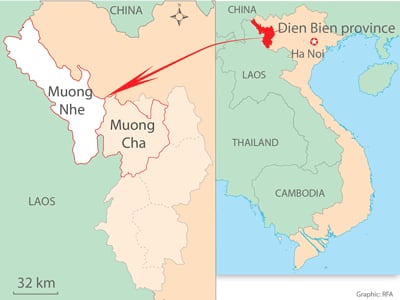Minority ethnic Hmong in Vietnam have staged mass protests calling for land reforms and religious freedom, drawing a military crackdown, a nongovernmental group and other sources said Thursday.
The U.S.-based Center for Public Policy Analysis (CPPA), which backs the Hmong cause, said 28 protesters were killed and hundreds are missing after the military moved to quell the protests in the far northwestern Dien Bien province near the border with neighboring Laos.
The CPPA claim could not be independently verified.
News reports said several thousand Hmong could have taken part in the protests over the last few days.
"There was a gathering among Hmong people expressing concern over land issues," a local government official identifed as Ngugen Quoc Thai said in a telephone interview from near the scene of the protests.
"I cannot talk any further, as police have installed secret devices in our communication system," Thai said.
Phi Trong Lap, a member of the People's Committee at Muong Cha district, neighboring the Muong Nhe district where the protests occurred, said separately that the demonstrations were not unusual and were related to land issues.
"This kind of gathering has happened so many times in the past, it's nothing strange," he said. "The gathering was related to accusations that the government is taking land from the people."
Vietnamese soldiers clashed with the protesters, a military source was quoted by Agence France-Presse as saying.
The Vietnamese army sent troop reinforcements after the demonstrations broke out several days ago, it said.
Soldiers "had to disperse the crowd by force," according to the military source, who did not provide details of any casualties or the number of troops involved.
"Minor clashes occurred between the Hmong and security forces," he added.
Intervene

Protesters numbered in their thousands and "the army had to intervene to prevent these troubles from spreading," the source said.
Local authorities had detained several people and opened an investigation, the military source said, adding that the Hmong were "incited" by local people wishing to exploit the May 7 anniversary of Vietnam's victory over French colonial forces at Dien Bien Phu in 1954.
Another People's Committee official said the Hmong were calling for a separate state and that people living outside Vietnam were believed to be orchestrating the demonstrations, the Associated Press news agency reported.
The official was identified only as Bac because he was not authorized to speak to the media.
The AP quoted police as saying that no arrests were made. No information was available on whether any Hmong were hurt or killed in the clash, it said.
But the CPPA charged in a statement issued in Washington that the Hmong were "attacked by Vietnam People's Army (VPA) troops and security forces."
"Twenty-eigh t... are confirmed dead in recent days, with hundreds more missing," it said, citing nongovernmental groups.
The protests were over land reform, illegal logging, and their "independent Christian and Animist religious beliefs,” Christy Lee, executive director of a group called Hmong Advance, Inc. (HAI) in Washington said in the statement.
In a statement citing Le Thanh Do, a senior provincial official, the Vietnamese Ministry of Foreign Affairs said the Hmong had gathered since early May and camped in unsanitary conditions believing that a "supernatural force" would arrive to lead them to "a promised land."
"Abusing the information, some people instigated and campaigned for the establishment of a separate kingdom of Hmong people, causing disorder, insecurity, and an unsafe situation," AFP quoted the statement as saying.
Worst case
The protests are believed to be Vietnam's worst case of ethnic unrest since demonstrations in 2001 and 2004 in the Central Highlands by the Montagnards, an indigenous minority and mostly Christian group pressing for religious freedom and land rights.
About 1,700 of the Montagnards fled to Cambodia after troops crushed protests against land confiscation and religious persecution.
Known as America’s “forgotten allies,” the mainly Christian Hmong sided with the United States during the Vietnam War, and many fled Laos in 1975 when the communist Pathet Lao took power.
Many Hmong say they fear persecution from the Lao government because of their Vietnam War-era ties with the United States.
Thousands of Hmong fought under CIA advisers during a so-called “secret war” against communists in Laos.
Some Hmong have previously called for a separate Hmong Christian state, he said.
A local official in Muong Nhe district, about 200 kilometres (125 miles) northwest of Dien Bien town, told AFP that more than 3,000 Hmong were still gathered on Thursday.
The scenic Dien Bien region is normally popular with Vietnamese travelers, some of whom warned each other on a Web chatroom to stay away from the area because of a "Hmong uprising."
Vietnam is a one-party state where public gatherings are strictly controlled and all traditional media are linked to the regime.
Reported by Quynh Chi for RFA's Vietnamese service and news agencies. Written in English by Parameswaran Ponnudurai.
